Overview
IMPACT was a three-year intervention study that worked with overweight and/or obese middle school students from Cleveland and at least one parent or guardian to compare the effects of two family-based behavioral interventions on change in BMI over the 36-month period. The study also assessed the additive value of an enriched school environment (participation in the We Run This City program).
Case Western Reserve University was one of four universities (along with Stanford, University of Minnesota, and Vanderbilt) funded through the National Heart, Lung and Blood Institute as part of the Childhood Obesity Prevention and Treatment Research Consortium (COPTR).
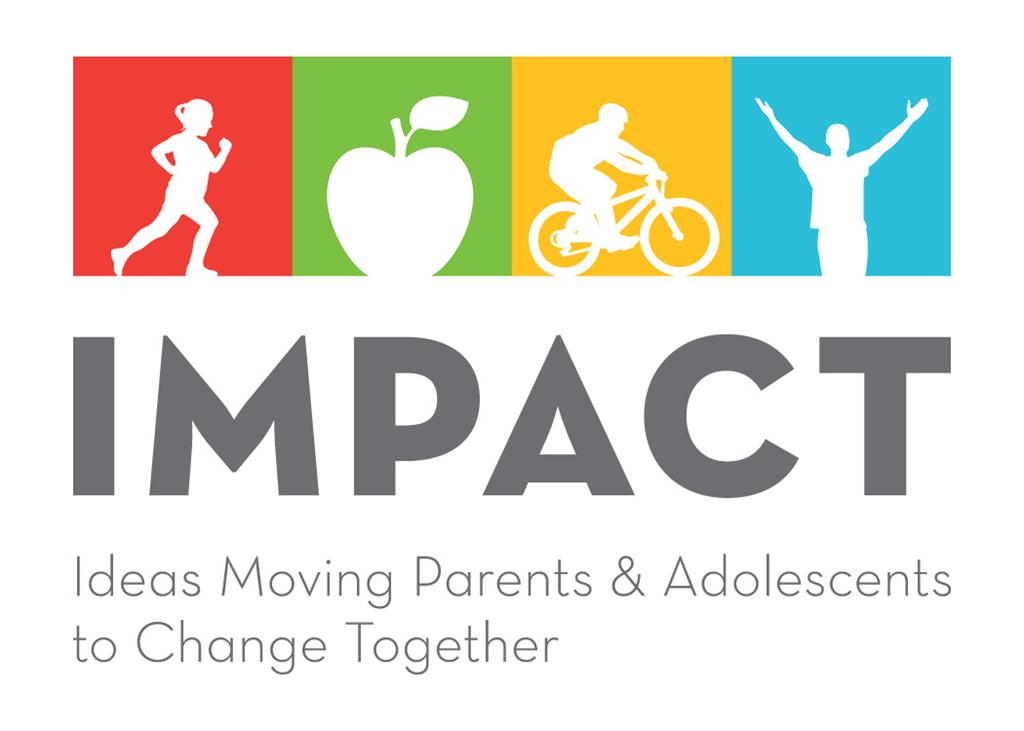
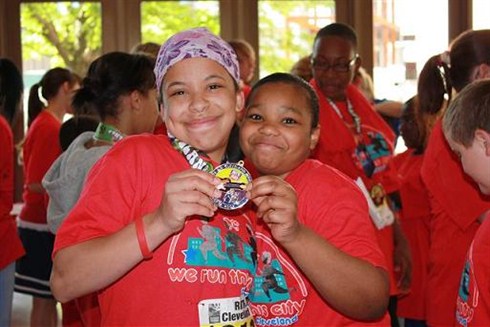

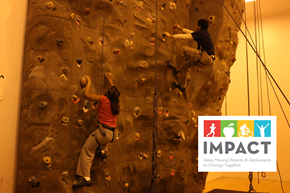
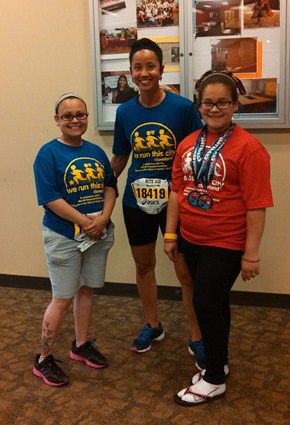
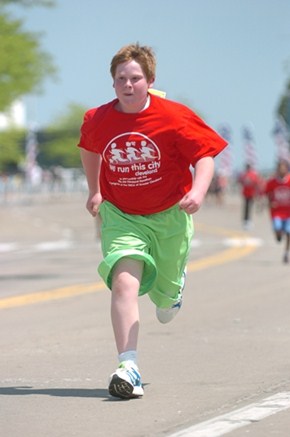
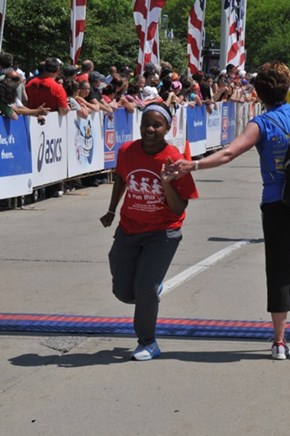

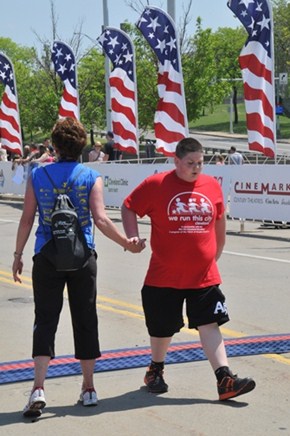
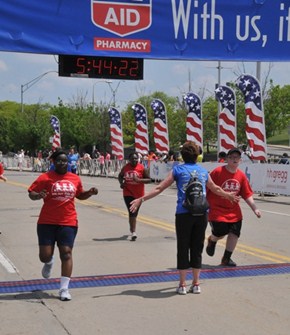
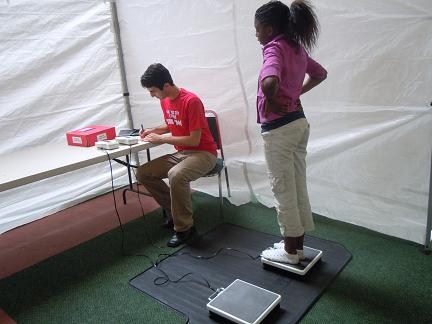
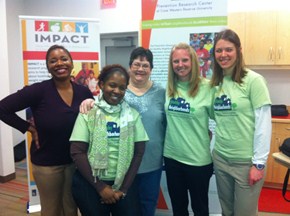
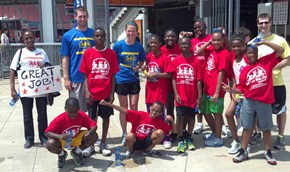
Methodology
Over two years of recruitment (2012-2014), the IMPACT team enrolled a total of 360 overweight or obese sixth grade students and at least one parent or guardian. The families were randomly assigned to one of three intervention approaches: SystemCHANGE, HealthyCHANGE, and Tools 4 Change (control).
Family interventions were conducted over the full three-year period, with assessments conducted at baseline and 12, 24, and 36 months after randomization to measure a host of variables related to the individual (anthropometrics, biomarkers, surveys, etc.), family, school, and neighborhood. Approximately one-third of the youth were also enrolled in a school that participates in the We Run This City (WRTC) Youth Marathon Program, a study-enriched YMCA-sponsored school fitness program that encourages physical activity in urban youth. IMPACT navigators from the PRCHN supported students, coaches, and the teams.
Most trials of interventions to prevent or treat childhood obesity have shown limited effectiveness. The IMPACT study’s multi-level approach tried to take into account the numerous factors contributing to childhood obesity and the probable complex interventions needed to help children obtain and maintain healthy weights. Several features were built into the IMPACT project to improve its effectiveness over past studies of obesity management within this vulnerable population. These features included:
-
- Strong community engagement (Cleveland Metropolitan School District involvement, YMCA programming)
- Extensive formative work (separate focus groups with children and parents, a one-year pilot test of the family-level interventions, and study recruitment procedures)
- Use of a responsive intervention to allow individualization and future replication of the interventions
- Test of a novel approach to behavior change (SystemCHANGE)
- Strong consideration of environmental variables (home, school and neighborhood food environments, peer norms surrounding nutrition and physical activity)
Learn more about the IMPACT Study recruitment and training process
IMPACT Results
IMPACT worked with 360 overweight and obese middle school students and one corresponding parent or guardian over a three-year period. Nearly 50% of students moved at least once during the three years of the study, and 10% moved more than once. However, the IMPACT study ended with a remarkable 92% retention rate.
Body mass index (BMI) was the primary outcome of the IMPACT study. Through rigorous protocols, participants’ heights and weights, along with several other measures, were measured annually. At the end of the study, researchers found no significant difference in participants’ BMI over the three year period between the three intervention groups. Moreover, none of the four COPTR sites showed intervention effects on the BMI of their participants.
There were some positive results. Approximately 13% of children participating became normal weight over the course of the three years. Looking at the school intervention specifically, while students who participated in WRTC had no change in BMI compared to those who did not participate in WRTC, participants that completed more training showed a decrease in systolic blood pressure.
While this study determined null results, it has sparked new research questions, among them:
-
- The impact of moving and/or changing schools on children’s physical and mental health
- The influence of neighborhood characteristics (physical, social, economic) on health
- The role of the food environment on diet and health
- The role of parental characteristics (e.g., weight and BMI) on the child’s health and health-related behaviors
- The influence of high participation in both family and school interventions on health
- Predictors of recruitment and retention for the school intervention (WRTC)
- Comparison of participants who had a reduction in BMI to those who did not
Publications
Moore, SM, Borawski, EA, Love, TE, Jones, SD, McAleer S, Casey, T, Hardin HK, Long, M, Nevar, A, Plow, M, Thomas, C, Stevens, J, Truesdale, KP, Pratt, C, Uli, N, Trapl, E. Two Family Interventions to Reduce BMI in Low-Income Urban Youth: A Randomized Trial Youth. Pediatrics Jun 2019, 143 (6) e20182185; DOI: 10.1542/peds.2018-2185.
Borawski EA, Jones SD*, Yoder LD, Taylor T, Clint BA, Goodwin MA, et al. We Run This City: Impact of a Community–School Fitness Program on Obesity, Health, and Fitness. Prev Chronic Dis 2018;15:160471. DOI: http://dx.doi.org/10.5888/pcd15.1604
Moore, S.M., Komtom, V., Adegbite-Adeniyi, C., Dolansky, M.A., Hardin, H.K., Borawski, E.A. Development of the Systems Thinking Scale for Adolescent Behavior Change. West J Nurs Res. 2017 Mar 1. [Epub ahead of print] PubMed PMID: 28303755.
Moore, S.M., Borawski, E.A., Cuttler, L., Ievers-Landis, C.E., Love, T.E. IMPACT: a multi-level family and school intervention targeting obesity in urban youth. Contemp Clin Trials. 2013 Nov;36(2):574-86. doi: 10.1016/j.cct.2013.08.009. Epub 2013 Sep 2. PubMed PMID: 24008055; PubMed Central PMCID: PMC3843979.
Moore, S.M., Killion, C.M., Andrisin, S., Lissemore, F., Primm, T., Olayinka, O., Borawski, E.A. Use of Appreciative Inquiry to Engage Parents as Co-Designers of a Weight Management Program for Adolescents. Child Obes. 2017 Jun:13:(3):182-189. PubMed PMID: 28187267.
